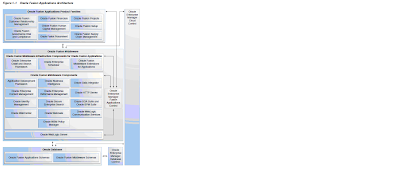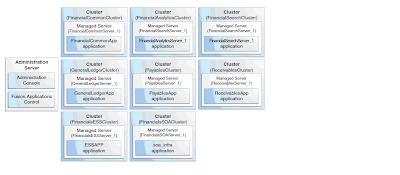I was trying to build resource base with Fusion Apps knowledge. It's a huge subject. So I was wondering how to jump start with some basic ideas. Thought of putting things together from different places. Hope this will help some of you who are still struggling to find out where to start from. Here we go with the building blocks
An installation of Oracle Fusion Applications is logically
broken up into groups of features. Each set of features is known as product
offerings, which represent the highest-level collection of functionality
that you can license and implement. A provisioning configuration is a
collection of one or more product offerings. During installation, you select a
product offering or a combination of offerings as a way to install the product
families. Product families are comprised of one or more Java EE applications
specific to Oracle Fusion Applications. An application can contain multiple
products, and a product can also span multiple applications. A product
typically has a one-to-one correspondence with an EAR file. Figure 1–2 shows two
applications, PayablesApp and ReceivablesApp, each of which is mapped to the
same product, Payments.
Oracle Enterprise
Manager Fusion Applications Control
Weblogic Server Domains
See "What Is an Oracle WebLogic Server Domain?"
in the Oracle Fusion Middleware Administrator's Guide to understand the
following concepts for Oracle WebLogicServer:
As an example of greater detail for a product family, Figure 1,1 shows
a portion of the domain for the Oracle Fusion Financials product family with an
Administration Server and eight Managed Servers in a cluster. The applications
are each deployed to a Managed Server within a cluster. In addition to the
applications for Oracle Fusion Financials, the domain also contains an Oracle
Enterprise Scheduler cluster and a SOA cluster. The Oracle Enterprise Scheduler
(ESSAPP) application manages job requests for the product family. The SOA
Infrastructure (soa-infra) application hosts the SOA composites for the
applications in the product family.
The Oracle Fusion Applications Oracle home directory (FA_ORACLE_HOME) is located under the APPLICATIONS_BASE/fusionapps directory The /fusionapps directory is an Oracle Fusion Applications Middleware home (FA_MW_HOME). Figure above shows this directory structure.
I have included one post to HCM Topology View to map the above with actual domain
Oracle Enterprise Manager Fusion
Applications Control (Fusion Applications Control) enables you to manage a
single product family in an Oracle WebLogic Server domain for the Oracle Fusion
Applications environment, including the products, applications, and Oracle
Fusion Middleware components. As a part of management, you can monitor the
runtime performance metrics for the various Oracle Fusion Applications
and Oracle Fusion Middleware
components.
Oracle Enterprise Manager Cloud Control
Oracle Enterprise Manager Cloud
Control (Cloud Control) enables you to monitor and manage the complete IT infrastructure
for Oracle Fusion Applications from a single console. You can monitor all the
product families, Oracle Fusion Middleware components, and the Oracle Database.
For example, you can monitor all the Oracle WebLogic Server domains for all the
product families from one console.
Oracle Enterprise
Manager Database Control
Oracle Enterprise Manager Database Control (Database
Control) enables you to manage the Oracle Database.
- Oracle WebLogic Server
domains
- Managed Servers and the
Administration Server
During installation, the applications for a single product
family are deployed to one Oracle
WebLogic Server domain. Within a single
domain, an Administration Server hosts the application for Fusion Applications Control, and
the Java EE applications for the product family deploy to the Managed
Servers. The Managed Servers are grouped together into a cluster for each
application of the product family. Figure
above shows a domain with an Administration
Server and three Managed Servers in clusters. If you want to scale out the Java
EE application, you simply add new servers to the cluster. In an Oracle Fusion
Applications environment, the domains are predefined so that the product
families and their dependencies are always stored in a standardized
arrangement.
1.1 Oracle WebLogic Server Domain for the Oracle Fusion Financials Family
The Oracle Fusion Applications Oracle home directory (FA_ORACLE_HOME) is located under the APPLICATIONS_BASE/fusionapps directory The /fusionapps directory is an Oracle Fusion Applications Middleware home (FA_MW_HOME). Figure above shows this directory structure.
The
Oracle home contains the following subdirectories:
·
/fusionapps/applications/lcm: The life cycle management
directory. Contains the patching framework artifacts in the following
subdirectories:
o
../ad/bin: Patching framework software
and executables, including C artifacts and configuration scripts, that set the
environment and start the corresponding utility.
o
../ad/java: Java artifacts.
o
../ad/db/sql: Database artifacts and SQL
files.
o
../ad/lib: Application libraries.
o
../ad/template: Configuration files or
templates delivered and used by the patching framework during configuration
activities.
·
/fusionapps/applications/bin: Executables
called by Enterprise
·
/fusionapps/applications/product_family: Container directory for
artifacts specific to a product configuration, for example,
/ORACLE/fusionapps/fin.
·
/fusionapps/applications/admin: Patching framework
environment properties file (FUSION_env.properties),
Oracle Fusion Applications AutoPatch, and the patching logs, reports, and
administration files. These files are required by Oracle Fusion Applications
Patch Manager.
·
/fusionapps/applications/lib: Applications-specific
libraries.
·
/fusionapps/applications/OPatch: Contains the OPatch utility
called by Oracle Fusion Applications Patch Manager when patching middleware
artifacts.
Fusion Apps Product Family Directory Structures
/fusionapps/applications/product_family/product:
Product grouping within a product family. For example,
/fusionapps/applications/fin/ar represents the Account Receivables product in
the Financials product family.
/db/plsql/: PL/SQL packages and bodies for a given product, for
example, .../fin/ar/db/plsql/arp_process_line.pkh.
/db/sql/: SQL scripts for a given product. For example,
.../fin/ar/db/sql/ar_ar_rev_rec_typ_type.sql.
/db/data/lba/US/: Product-specific seed data files, striped by
Logical Business Area (LBA). Note that sub-directories could exist in the
top-level seed data directory because some LBAs can have sub-LBAs. For example,
.../fin/ar/db/data/FinArCustomers/US/ArlookupTypeSD.xlf.
/fusionapps/applications/product_family/deploy:
Container directory for deployable artifacts, composites, Java EE applications
(such as Oracle Application Development Framework and Oracle Enterprise
Scheduler Service).
/fusionapps/applications/product_family/security/:
Product family directory containing security-related files.
Hope this will help.
Note - I have copied contents from different docs published by oracle to make it easy for beginners.
I have included one post to HCM Topology View to map the above with actual domain








No comments:
Post a Comment